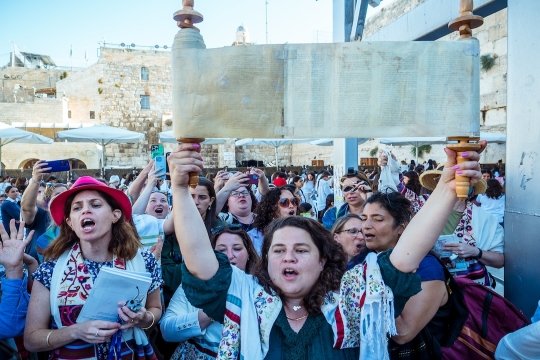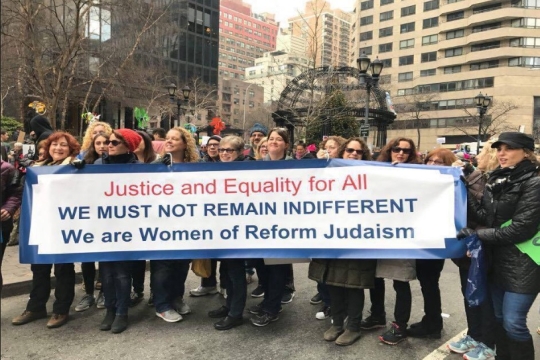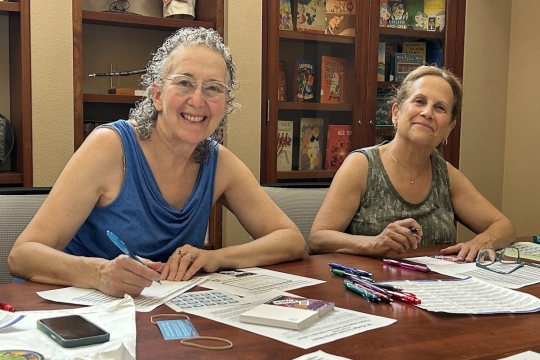
The above excerpt is from WRJ CEO Rabbi Liz P.G. Hirsch's d'var torah from Friday evening of Fried Women's Conference in New Orleans, LA. Please find a full transcript of her excerpted remarks below.
For our final what if, I want to tell you a story.
Once, a family came to meet with a rabbi. We’re new to your community, they said. Our daughter is twelve, and we want her to have a bat mitzvah this year.
The rabbi looked at the family, seated in her study – two parents, a mother and a father, and a daughter. The mother, a person of color, shared that she was not Jewish, but had committed to raising her daughter as a Jew. The father of the potential bat mitzvah hadn’t been engaged in Jewish life very much growing up.
The rabbi knew the rules, the laws, behukotai – of her synagogue. A family must be members of the congregation for a minimum of three years, and a child must study in religious school for that entire time.
The rabbi turned to the daughter, who had been quiet. “Tell me,” the rabbi said, “is this something that you want? You’ll have a lot of studying to do to make this happen in six months. But we’ll make it fun.”
The daughter’s face lit up. “Yes,” she said. “This is something I want. I asked my parents if we could meet with you today.”
With that YES, the rabbi knew her answer, too.
What if – that family asked that rabbi – what if, instead of going by the book, of prioritizing rules over people, what if we said yes to everyone who wanted to be counted in.
That rabbi – who said yes to a Jewish family of color, to an interfaith family, to a patrilineal Jewish family, to a family who arrived later than most to Jewish life and Jewish education – that rabbi said YES.
While I’ve changed some details, I have been that rabbi, in the congregation I served before my role at WRJ. That rabbi is also your rabbi, and your cantor. That is your sisterhood president, your district leadership. That is you. That can be us. We can all say YES to everyone who wants to count in to our communities, to our sisterhoods and our women’s groups, and to WRJ.
What if we told them all YES?
What if, in this moment of fracture and antisemitism and pain – what if we said YES to everyone who wants to be a part of Jewish life?
Once again, our history can inform our future.
In 1965, we led our entire movement – we were the first arm or affiliate to advocate for LGBTQ inclusion in Reform Jewish life. Our resolution from that year is still a proud reference point for current RAC Director, Rabbi Jonah Pesner, who will join us later this weekend, when he testifies in Congress or credentials our movement with coalition partners. WRJ opened the door.
In 1978, Rabbi Alex Schindler, the second president of the Union, addressed the USHC Board of Trustees in Houston, Texas. It’s an inspiring speech, even as some of the ways we think about interfaith marriage and conversion have changed.
In those remarks, Schindler established the outreach priorities of our Reform Movement for decades to come.
First, he cemented the status of a Jew-by-choice within our congregations and communities. Quoting Maimonides, the 12th century rabbi, Schindler affirmed:
You ask whether you, being a [convert], may speak the prayers: "our God and God of our [ancestors]"…
Pronounce all the prayers as they are written and do not change a word. Your prayers and your blessings should be the same as any other Jew...”
In our movement, in WRJ, we rejoice with those who have converted to Judaism, and also, we don’t make a big deal about it, because a Jew is a Jew. We make no distinction between Jews by birth or Jews by conversion.
Next, Schindler urges the inclusion of interfaith families in our communities. While he personally opposes intermarriage, which was the majority belief of his day, he speaks clearly: “remove the ‘not-wanted’ signs from our hearts,” he says, and welcome these people in. Think about the ripples of this statement. What richness these families bring to our communities.
Schindler then speaks in favor of patrilineal descent, welcoming in children born of either a Jewish mother or father. His words are inclusive and feminist:
“why should a movement which from its very birth-hour insisted on a full equality of men and women in religious life…accept the principle that Jewish lineage is valid through the maternal line alone?”
And then, Schindler exhorts all arms of the Movement, including our own, to adopt an Outreach program. To open the door to all who are seeking Judaism.
For his own time, Schindler asked the question I have been asking you: What if we said YES?
And WRJ answered that call. In 1979, at the NFTS Biennial, held in Toronto, Canada, the Committee on Interfaith and Intrafaith Relations made this report:
“this was the year of… Rabbi Schindler’s magnificent challenge, that we should find new and creative ways to reach those who are wandering the world without faith to sustain them in times of trouble.” They go on to recount local and district activities, including Or Ami award winners working in the area of outreach and inclusion.
Friends, we are living in that year again, a time of trouble, when many are wandering the world, looking for a doorway into faith. What if we open that door. What if we invite them in?
We know they are out there. A recent Jewish Federations study reports:
“Among Jews who are not members of synagogues… 37% [now] say now they’d be open to joining one…. The most synagogue interest comes from those who identify as Reform or as having no denomination…
41% of … Reform Jews who are unaffiliated are open to joining [a synagogue] ...
and 43% percent of Jews expressed interest in increasing their engagement with Jewish life…”
We have a very real opportunity before us to say YES.
Our WRJ North American Board has taken a crucial step, unanimously approving amendments to our constitution to open up WRJ membership to those who identify as women, as non-binary, and as gender fluid, and also to welcome both those who identify as Jewish, and those who are on a Jewish journey. Often, sisterhoods and WRJ are the first place that someone enters their path to Jewish life.
Our constitutional amendments committee, led by WRJ Secretary and incoming VP, Karen Goldberg, is not proposing to change our name or our mission. We are Women of Reform Judaism. And these proposals are not proscriptive – they are descriptive of those already among us, of those here with us today. People who resonate with our mission and a vibrant Reform Jewish life through a feminist and empowering lens.
Thank you to our WRJ Board, who said YES, to welcome in everyone who wants to be part of WRJ.
Next month, on June 18th, these amendments go to a broader vote at our Legislative Body meeting. In addition to all WRJ North American board members, each sisterhood or women’s group in good standing are eligible to send voting delegates, with provisions for individual members as well.
Any WRJ staff or board member can provide more information about how to show up for this important meeting. What if – what if you said yes? What if you came out to vote for inclusion, welcoming, and belonging?
As we did in 1965, let us lead the way. As we did in 1979, let us answer the call. Let us say yes to leadership. Let us say yes to welcoming. Let us say YES.
Shabbat shalom.
Related Posts

The Power of "Why Not?"

A Privilege and A Sacred Duty


